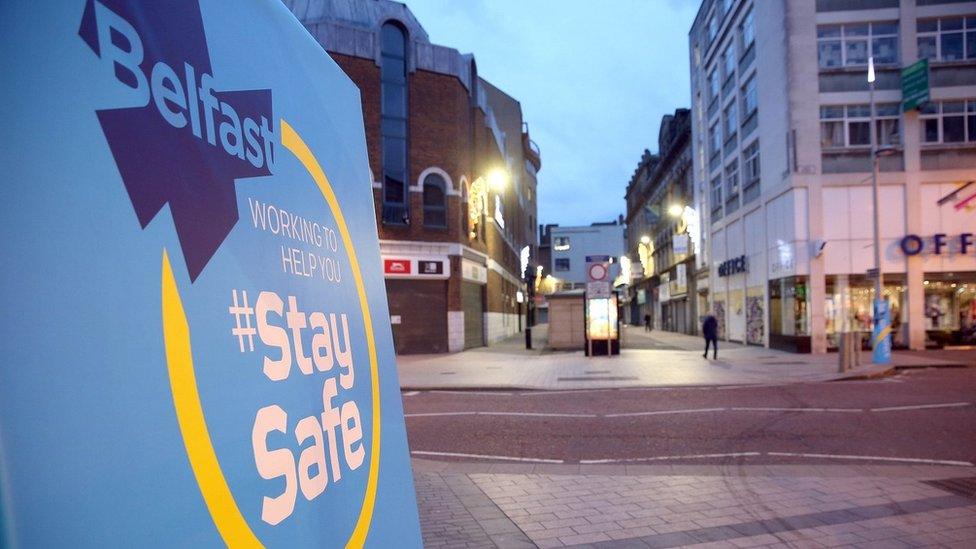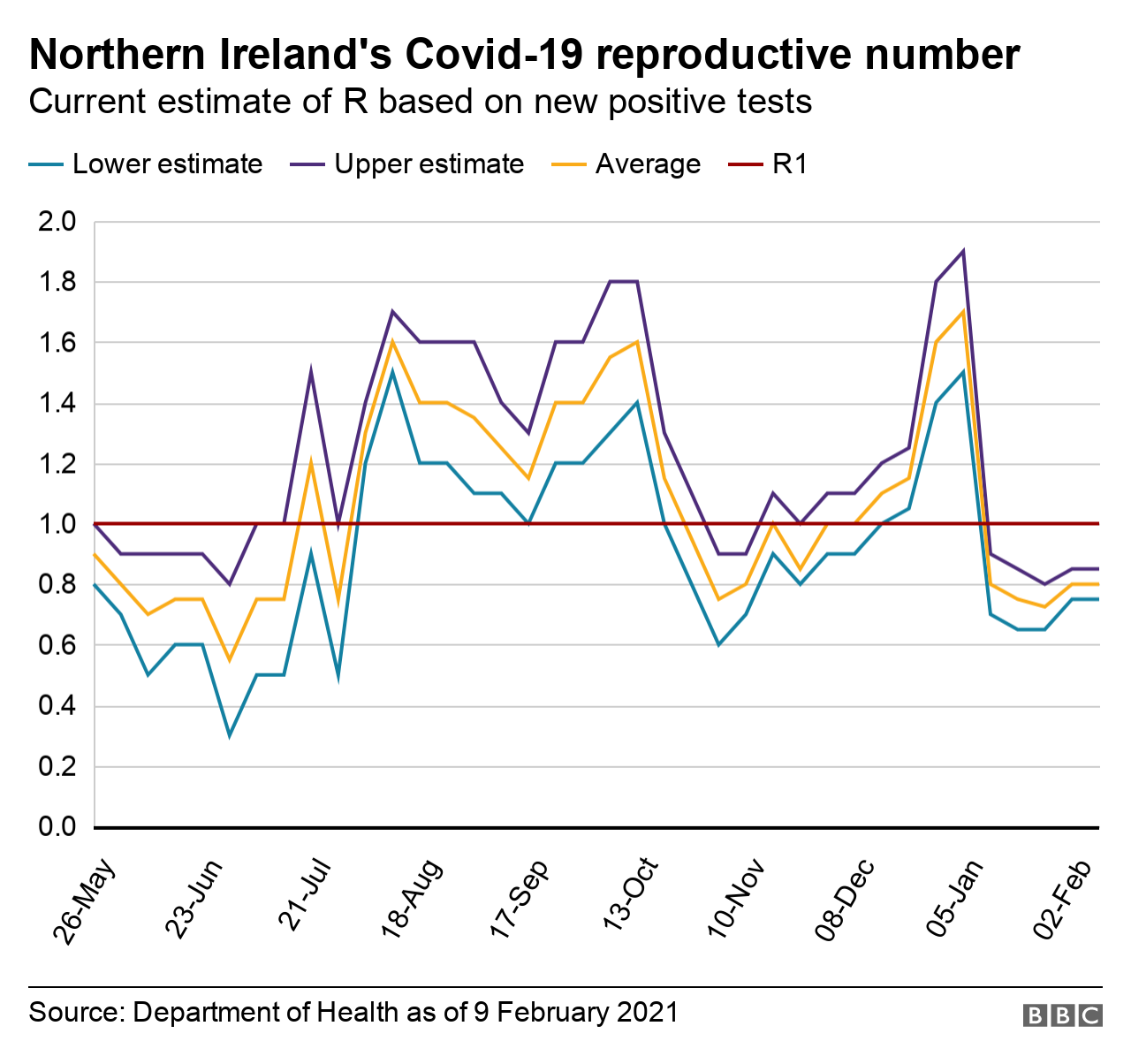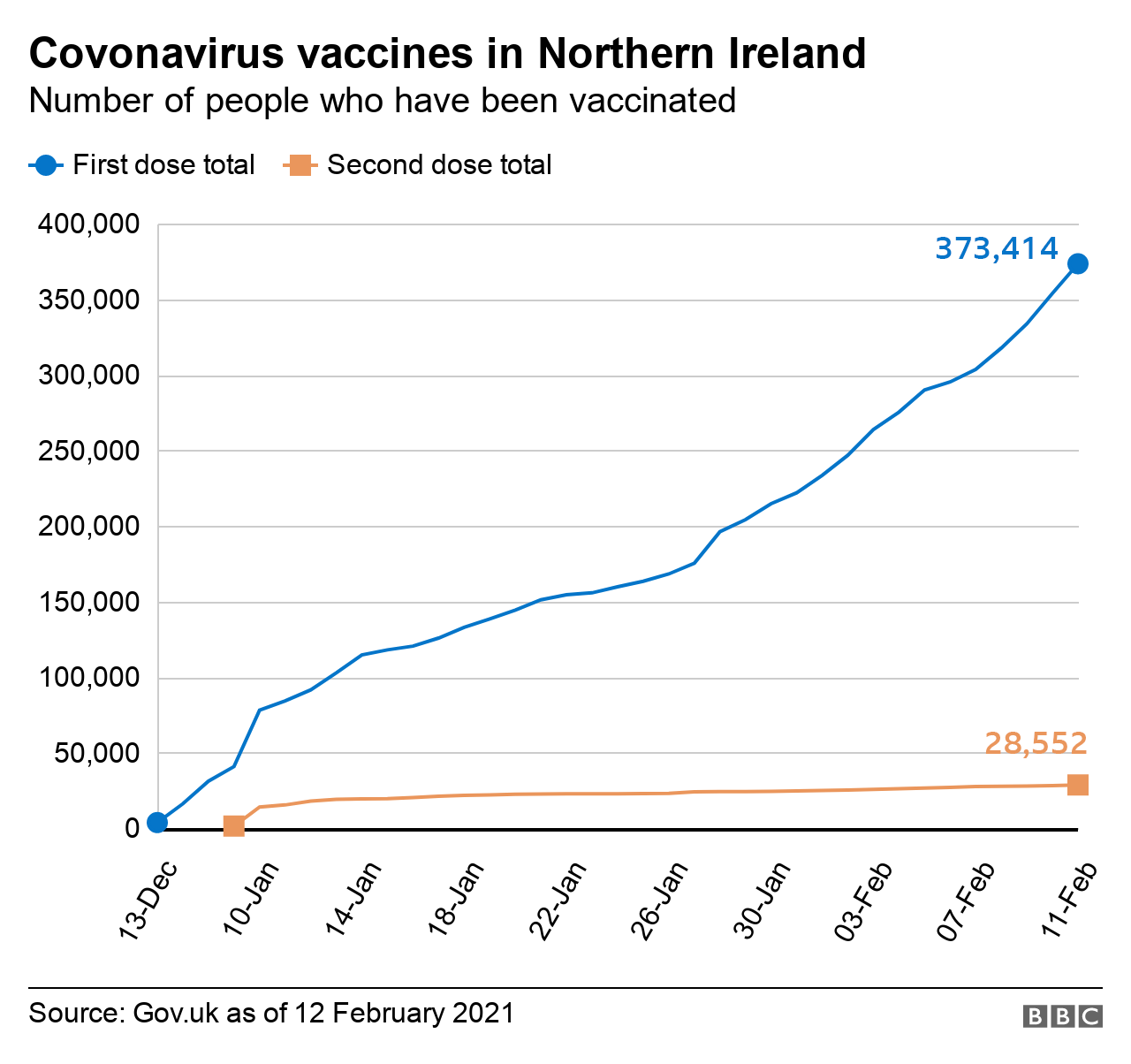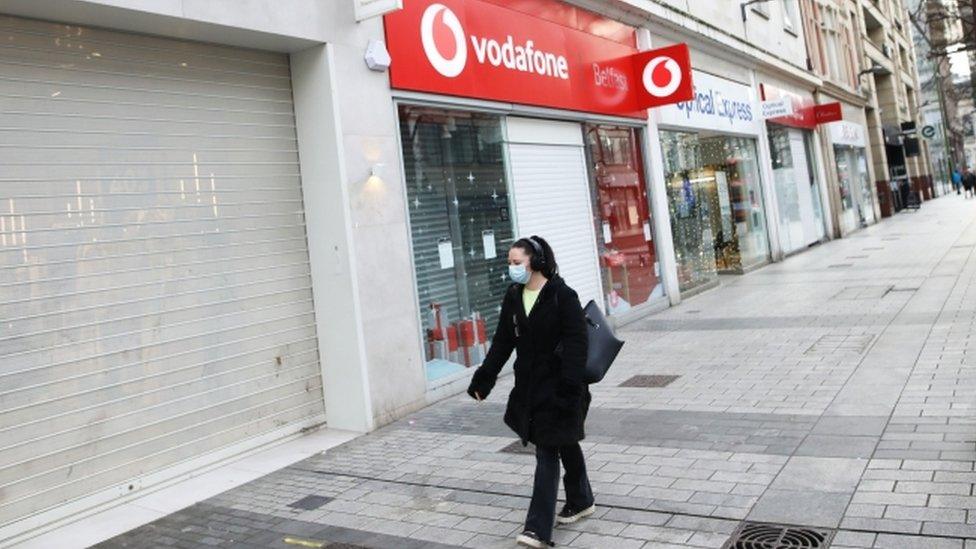Covid-19: Stormont faces bumpy ride to ease NI lockdown
- Published

It's been a long and difficult seven weeks since Northern Ireland re-entered lockdown.
Predictions of a post-Christmas surge in Covid-19 cases, increased hospital admissions and ultimately a rise in deaths, came true.
Restrictions imposed by the executive to relieve pressures have been working and they'll be reviewed on Thursday.
But officials are again urging caution about how we exit lockdown.
It falls to the five parties that make up Stormont's power-sharing executive to decide whether to extend restrictions beyond 5 March, or begin the process of lifting them.
Few on the hill believe lockdown can be eased before Easter, and Health Minister Robin Swann already hinted at that in a previous paper to his executive colleagues.
There are several reasons for this.
Officials say with St Patrick's Day and the Easter holidays around the corner, they don't want to prematurely allow more opportunities for people to mix, which would likely lead to another rise in cases.
At his weekly press briefing, Mr Swann said we "must not let history repeat itself", harking back to restrictions being eased for Christmas - a decision, he has since said, he regrets.
Ministers also have to assess the latest Covid-19 statistics.
Northern Ireland has passed the peak of the third wave, but the number of people being treated in hospital for Covid-19 and those requiring intensive care remains high.
Then look at Northern Ireland's reproduction (R) number, which measures how quickly the virus is spreading.

Although it has fallen from a peak of about 1.9 last month, Mr Swann said it has now "stabilised and stagnated" at about 0.75-0.85 in the community.
So, while the spread of the virus has been decreasing, experts argue it is not yet close enough to last summer's levels, which allowed the executive to initially ease restrictions.
They want the R-number to drop even further, so that reopening can take place with infection levels starting from as low a base as possible.
However, there's a recognition that lockdown cannot continue indefinitely, with the public having felt the effects of restrictions much more acutely this time.
As one Stormont source put it: "We have to let the air out of the balloon - but it has to be managed."
How does the executive do that?
Expect to hear phrases like "baby steps" more often, as ministers try to maintain a careful balance between the health response and giving people hope.
Their new pathway to recovery paper is expected to be published in the coming weeks (we don't know when exactly), but again, it's unlikely to include any indicative dates.
It will be a gradual rather than total reopening, permitting one sector at a time and measuring its effects before moving to the next.
Many businesses that have been shut for months may find their wait to reopen again getting longer, and the executive will have to consider extra financial support for those sectors being told to stay closed.
There are other new factors that ministers also have to weigh up while making their decisions.
New variants
NI's Chief Medical Officer Dr Michael McBride raised eyebrows on Tuesday when he said some restrictions would likely be needed until 2022.
But it was what he said about new variants of coronavirus that will play into the politicians' thinking around relaxing the lockdown.
It's believed at least 50% of current Covid-19 cases in NI are related to the more transmissible variant that was detected in Kent before Christmas.
Dr McBride pointed out that Stormont has "no experience" of relaxing restrictions with a new variant present, and as long as the pandemic continues, more mutations are likely to emerge and hinder recovery from lockdown.
Vaccines
Northern Ireland is undoubtedly in a different place than last June, when the idea of having vaccines to combat Covid-19 seemed a far-off prospect.
The vaccination programme has been moving well, with more than 370,000 people in Northern Ireland having received their first jab.

There is an argument that as more vulnerable people are vaccinated, that should make it easier for restrictions to be lifted to allow some elements of pre-Covid life to resume.
Stormont ministers will take that on board, but they're likely to be advised that the effects of the programme have yet to be properly felt to allow a wider lifting of restrictions.
Schools
Most schools in Northern Ireland are currently set to reopen on 8 March, in line with other parts of the UK.
But if the executive agrees to extend lockdown until Easter that could mean homeschooling and remote learning remain for longer too.
On Tuesday, Dr McBride said officials believe the effect of schools on the R-number is between 0.3-0.6.
When it comes to keeping R below one, every little helps and that figure may give some ministers pause for thought.
However, the executive previously said its top priority was to keep schools open, so perhaps it could agree to impose further safety mitigations or introduce a phased return for some key year groups.
Public mood and internal divisions
Stormont's politicians are always keen to take a temperature check on the ground when deciding how to manage restrictions.
The previous rows within the executive about imposing restrictions, at a time when the Covid situation was deteriorating, drew widespread criticism.
In November, the DUP was left politically isolated when it twice deployed a cross-community veto to block an extension of restrictions.
But with a perception some people are running out of patience with the lockdown as things are improving again - could that influence some in the executive to now demand a faster reopening?
Whatever happens, Stormont ministers are tasked with making decisions that have only got harder since the onset of the pandemic 11 months ago.
Helping Northern Ireland navigate a way out of all this remains a bumpy ride.

BBC News NI are keen to hear your questions about coronavirus following the executive meeting on Thursday to review restrictions.
We'll answer as many as possible with our reporter Jayne McCormack live at 19:00 on the BBC News NI website, iPlayer and BBC News NI Facebook Page.
If you are reading this page on the BBC News app, you will need to visit the mobile version of the BBC website to submit your question on this topic.

Related topics
- Published10 February 2021

- Published2 April

- Published29 July 2021
